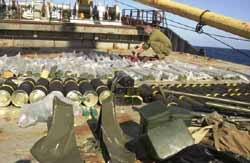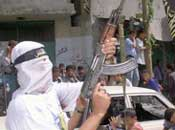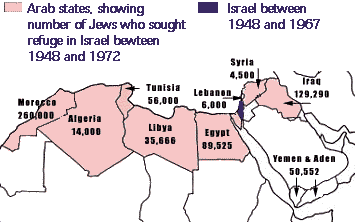 Mock
United Nations
Mock
United Nations
 Mock
United Nations
Mock
United Nations
If you have any questions or would like more information, please
contact Eric at israeluw@u.washington.edu.
You can also visit our website at http://students.washington.edu/israeluw.
Israel wants peace
After its victory in the Six-Day War, Israel hoped the Arab states would enter peace negotiations. Israel signaled to the Arab states its willingness to relinquish virtually all the territories it acquired in exchange for peace. As Moshe Dayan put it, Jerusalem was waiting only for a telephone call from Arab leaders to start negotiations.
These hopes were dashed in August 1967 when Arab leaders meeting in Khartoum adopted a formula of three noes: "no peace with Israel, no negotiations with Israel, no recognition of Israel...."
In 1979, Egypt made peace with Israel, and today that peace lasts. Israel returned ALL of the Sinai Peninsula to Egypt. Then Defense Minister Ariel Sharon bulldozed settlements and forced 7,000 Israeli's to leave the Sinai.
In 1993, the Oslo Accords were signed where the Israeli government accepted the Palestinian Authority as the representatives of the Palestinians, and the PLO recognized Israel.
In 1994, Israel signed a peace treaty with Jordan.
In 2000, at the Camp David Summit, then Prime Minister Ehud Barak and President Clinton offered a GENEROUS offer to the Palestinians as part of a comprehensive settlement.
Dennis Ross, former Middle East Envoy, was a prime negotiator in the 2000 Camp David Accords which were to have provided a comprehensive final settlement. Here is an interview with Ross on Fox News. He has written many articles, including "Think Again: Yasir Arafat."
The second intifada (September 2000 -
present)
Palestinians believe that the second intifada was sparked by Likud leader Ariel
Sharon and the “thousands of Israeli soldiers” who accompanied him.
They believe that violence was carried out through unprovoked attacks by Israeli
forces, which invaded Palestinian-controlled territories and “massacred”
defenseless Palestinian civilians, who merely threw stones in self-defense.
The only way to stop the violence, then, was for Israel to cease fire and remove
its troops from the Palestinian areas.
The truth is dramatically different. It was concluded in the Mitchell Report (May 4, 2001) that Sharon's visit to the Temple Mount DID NOT cause the latest intifada.
Imad Faluji, the Palestinian Authority Communications Minister, admitted months
after Sharon's visit that the violence had been planned in July, far in advance
of Sharon's "provocation." "It [the uprising] had been planned
since Chairman Arafat's return from Camp David, when he turned the tables on
the former U.S. president and rejected the American conditions."
Official Palestinian Authority media exhorted the Palestinians to violence.
On September 29, the Voice of Palestine, the PA's official radio station sent
out calls "to all Palestinians to come and defend the al-Aksa mosque."
The PA closed its schools and bused Palestinian students to the Temple Mount
to participate in the organized riots.
Just prior to Rosh Hashanah (September 30), the Jewish New Year, when hundreds of Israelis were worshipping at the Western Wall, thousands of Arabs began throwing bricks and rocks at Israeli police and Jewish worshippers. Rioting then spread to towns and villages throughout Israel, the West Bank and Gaza Strip.

Photo of Palestinian child dressed as a suicide bomber
Internal Security Minister Shlomo Ben-Ami permitted Sharon to go to the Temple Mount – Judaism’s holiest place – only after calling Palestinian security chief Jabril Rajoub and receiving his assurance that if Sharon did not enter the mosques, no problems would arise. The need to protect Sharon arose when Rajoub later said that the Palestinian police would do nothing to prevent violence during the visit.
Sharon did not attempt to enter any mosques and his 34 minute visit to the Temple Mount was conducted during normal hours when the area is open to tourists. Palestinian youths — eventually numbering around 1,500 — shouted slogans in an attempt to inflame the situation. Some 1,500 Israeli police were present at the scene to forestall violence.
There were limited disturbances during Sharon's visit, mostly
involving stone throwing. During the remainder of the day, outbreaks of stone
throwing continued on the Temple Mount and in the vicinity, leaving 28 Israeli
policemen injured, three of whom were hospitalized. There are no accounts of
Palestinian injuries on that day. Significant and orchestrated violence was
initiated by Palestinians the following day following Friday prayers.


Left: A photo of the Karine-A
ship, a ship carrying 50 tons of illegal weapons destined for the Palestinian
Authority.
Right: Picture of a terrorist group. Operating in the Disputed Territories are
several terrorist groups including HAMAS, Islamic Jihad, and the Al-Aqsa Martyrs
Brigade (a wing of Yasir Arafat's armed guards).
REFUGEES
Had the Arabs accepted the 1947 UN resolution, not a single Palestinian would have become a refugee. An independent Arab state would now exist beside Israel. Not every refugee was forced to flee. The Palestinians left their homes in 1947-49 for a variety of reasons. Thousands of wealthy Arabs left in anticipation of a war, thousands more responded to Arab leaders' calls to get out of the way of the advancing armies, a handful were expelled, but most simply fled to avoid being caught in the cross fire of a battle.
Egypt's Hosni Mubarak has said in the Jerusalem Post, (January 26, 1989).“The Palestinian demand for the 'right of return' is totally unrealistic and would have to be solved by means of financial compensation and resettlement in Arab countries.” In a statement by Ralph Garroway, former director of UNRWA, he believes that “The Arab States do not want to solve the refugee problem. They want to keep it as an open sore, as an affront to the United Nations and as a weapon against Israel. Arab leaders don't give a damn whether the refugees live or die.”
Although much is heard about the plight of the Palestinian refugees, little is said about the Jews who fled from Arab states. Their situation had long been precarious. During the 1947 UN debates, Arab leaders threatened them. For example, Egypt's delegate told the General Assembly: "The lives of one million Jews in Muslim countries would be jeopardized by partition."
The number of Jews fleeing Arab countries for Israel in the years following Israel's independence was nearly double the number of Arabs leaving Palestine. Many Jews were allowed to take little more than the shirts on their backs. These refugees had no desire to be repatriated. Little is heard about them because they did not remain refugees for long. Of the 820,000 Jewish refugees between 1948 and 1972, 586,000 were resettled in Israel at great expense, and without any offer of compensation from the Arab governments who confiscated their possessions. Israel has consequently maintained that any agreement to compensate the Palestinian refugees must also include Arab compensation for Jewish refugees. To this day, the Arab states have refused to pay any compensation to the hundreds of thousands of Jews who were forced to abandon their property before fleeing those countries.

The Palestinians have actually had numerous opportunities to create an independent state, but have repeatedly rejected the offers:
In 1937, the Peel Commission proposed the partition of Palestine and the creation of an Arab state.
In 1939, the British White Paper proposed the creation of an Arab state alone,
but the Arabs rejected the plan.
In 1947, the UN would have created an even larger Arab state as part of its
partition plan.
From 1948 to 1967, Israel did not control the West Bank. The Palestinians could have demanded an independent state from the Jordanians.
The 1979 Egypt-Israel peace negotiations offered the Palestinians autonomy, which would almost certainly have led to full independence.
The Oslo process that began in 1993 was leading toward the creation of a Palestinian state before the Palestinians violated their commitments and scuttled the agreements.
In 2000, Prime Minister Ehud Barak offered to create a Palestinian state, but Yasser Arafat rejected the deal.
A variety of reasons have been given for why the Palestinians have in Abba
Eban's words, "never missed an opportunity to miss an opportunity."
Israeli Settlements and Security
In order to get a grasp of the concept, you must first understand the history behind that has led us up to the present time. I am not going to tell you that I am for the settlements, or why there should be settlements, but provide you with information about the settlements, and why they are there. If you come away with remembering just a few important facts, remember that the settlements are NOT ILLEGAL; the land is Jewish owned land, it is not stolen; and an overwhelming majority of Israeli’s — including both major parties — are willing to give up the settlements as part of a NEGOTIATED peace agreement.
In May 1967, Egypt blockaded the Straits of Tiran to all Israeli shipping and all ships bound for Israel. This in itself is an act of war. On June 5, 1967 Israel launched a preemptive strike against Egypt in a war now called the Six Day War. Jordan was told by Israel don’t attack us and we won’t attack you. Jordan was persuaded to attack by Egypt, and Israel captured the West Bank. At this time, Syria began to bomb oil refineries in Haifa, while Israeli forces were preoccupied in the Sinai and West Bank. After a miraculous six days, Israel more than tripled in size.
After the Six Day War, the United Nations passed Resolution 242, which in paragraph 1 called for:
-Withdrawal of Israeli armed forces from territories occupied
in the recent conflict;
-…political independence of every State in the area and their right to
live in peace within secure and recognized boundaries free
from threats or acts of force;
United Nations Resolution 338 can also be found here, calling for NEGOTIATIONS.
How do you get recognized boundaries? You have to negotiate! When Egypt finally decided that it wanted the Sinai Peninsula back, the Camp David Accords were signed in 1979. Israel returned ALL of the Sinai Peninsula to Egypt, and evacuated 7,000 Israeli’s living in the Sinai. Who dismantled the Settlements? It was current Prime Minister Ariel Sharon.
Israel immediately offered to return all of the territories in exchange for peace. 2 months later at the Arab League, Arab leaders came up with the three no’s: no peace with Israel, no negotiations with Israel, and no recognition of Israel.
After this, the first settlements were built in what is called the “Etzion Bloc,” nearby Jerusalem. This area was actually inhabited by Jews for a long time. During the War of Independence, 240 residents were massacred and the settlements were demolished. After the three no’s, the Labor government (now seen as the “doves”) encouraged the children of these descendents to return to the Etzion Bloc.
Why are there settlements? For starters, there are religious purposes. Jews have lived continuously in the land of Israel since Biblical times. These include such cities as Jericho, Hebron, Nablus, and Bethlehem. Sites in these cities include Rachel’s Tomb, and the Tomb of the Patriarchs: Abraham, Isaac, Jacob, Sarah, Rebecca, and Leah.
Another reason for the placement of settlements is the placement of them. Some of them are in hills that provide strategic defense purposes to Israel. This would include the road along the Tel Aviv-Jerusalem corridor, a site of heavy fighting during several wars.
This leads us to the year 2000, when then Prime Minister Ehud Barak and President Clinton tried to adopt a final negotiated settlement with the Palestinians. The details of this included the entire Gaza strip, about 95% of the West Bank with an equal swap of land around Gaza, and a capital in East Jerusalem. Israeli newspapers published figures MUCH higher than these, and the majority of Israeli’s nonetheless were for the deal. This shows that the Israeli public was willing to give up a lot more if they believed that they had a willing partner for peace, as they thought they had.
As far as the Settlements go in this agreement, there would have been three or four blocs of settlements that would have stayed in the West Bank, keeping only several large blocs. Dozens of settlements would have been evacuated. This would have been all CONTIGUOUS land, not cantons and Bantustans. This was one contiguous area with an overland highway connecting Gaza and the West Bank. (See the map HERE)
Instead of an independent Palestinian state, Arafat rejected this offer completely! Instead, the Palestinians turned to violence and terrorism. Israel knows it is in a dangerous neighborhood and CAN no longer show any signs of weakness. These two signs of weakness would be in 1991 when it did not respond to 39 Iraqi scuds, and in May 2000 when Israel unilaterally withdrew from Southern Lebanon.
It should be noted that the settlements comprise less than 2% of the West Bank. This is about 200,000 people. Now let’s say that there were to be an independent Palestinian state tomorrow. Why do these people, these JEWS, these ISRAELI’S, have to move? Why can’t they live in Palestine of they want? Did you know that there are 1 million Arabs who live within Israel, that are Israeli citizens? That is 20% of the population in Israel. If Jews were to be forbidden to live here in Seattle, or New York, or London, that is anti-Semitic. To say that Jews can’t live in Palestine is the same thing. If Arabs can live in Israel, why can’t Jews live in Palestine?
According to Khalil Shikaki, a Palestinian who spoke here the other night, he said that the Palestinians are adopting the same strategy as Hezbollah in Lebanon. Their tactic calls for an alternative solution to negotiation, and that is suffering. The goal is to provide as much blood, tears, and suffering to the other side. If Palestinians can scare Israeli’s as much as possible, they believe that Israel will be pressured to unilaterally withdraw from the West Bank and Gaza. He also realizes that the resettlement of Palestinian refugees, even within Palestinian territory, is an unreasonable demand that will not happen.
This pertains to Gaza. No Israeli government wants to be in Gaza. But if it were to evacuate tomorrow, Palestinians would boast this as a victory, and Israel would lose its deterrence power, as attacks would only escalate and continue because those in the West Bank would believe they could make the Israeli’s do the same.
So here is what we have. We have extremists on both sides. Because a negotiated settlement has not been agreed upon, religious Jews will continue to settle in the West Bank. At the same time you have Islamic terrorists who are deliberately and systematically terrorizing Israeli citizens. Palestinians need to realize that time is not on their side. If they continue to support terrorism and stall democratic reform, more settlements will continue to be built. This will only create more facts on the ground, meaning the only way out of this current dilemma is face-to-face negotiations.